Research
-
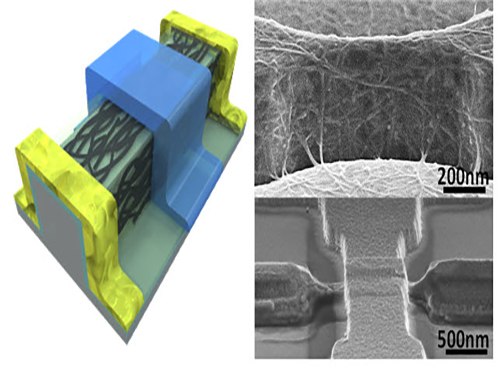 An Improved Carbon Nanotube Semiconductor
Professor Yang-Kyu Choi and his research team of the School of Electrical Engineering at KAIST collaborated with Professor Sung-Jin Choi of Kookmin University to develop a large-scale carbon nanotube semiconductor by using a 3-D fin-gate structure with carbon nanotubes on its top.
Dong Il Lee, a postdoctoral researcher at KAIST’s Electrical Engineering School, participated in this study as the first author. It was published in ACS Nano on November 10, 2016, and was entitled “Three-Dimensional Fin-Structured Semiconducting Carbon Nanotube Network Transistor.”
A semiconductor made with carbon nanotubes operates faster than a silicon semiconductor and requires less energy, yielding higher performance.
Most electronic equipment and devices, however, use silicon semiconductors because it is difficult to fabricate highly purified and densely packed semiconductors with carbon nanotubes (CNTs).
To date, the performance of CNTs was limited due to their low density. Their purity was also low, so it was impossible to make products that had a constant yield on a large-surface wafer or substrate. These characteristics made the mass production of semiconducting CNTs difficult.
To solve these difficulties, the research team used a 3-D fin-gate to vapor-deposit carbon nanotubes on its top. They developed a semiconductor that had a high current density with a width less than 50 nm.
The three-dimensional fin structure was able to vapor-deposit 600 carbon nanotubes per micrometer. This structure could have 20 times more nanotubes than the two dimensional structure, which could only vapor-deposit thirty in the same 1 micrometer width.
In addition, the research team used semi-conductive carbon nanotubes having a purity rating higher than 99.9% from a previous study to obtain a high yield semiconductor.
The semiconductor from the research group has a high current density even with a width less than 50 μm. The new semiconductor is expected to be five times faster than a silicon-based semiconductor and will require five times less electricity during operation.
Furthermore, the new semiconductor can be made by or will be compatible with the equipment for producing silicon-based semiconductors, so there will be no additional costs.
Researcher Lee said, “As a next generation semiconductor, the carbon nanotube semiconductor will have better performance, and its effectiveness will be higher.” He also added, “Hopefully, the new semiconductor will replace the silicon-based semiconductors in ten years.”
This study received support from the Center for Integrated Smart Sensors funded by the Ministry of Science, ICT & Future Planning of Korea as the Global Frontier Project, and from the CMOS (Complementary Metal-Oxide-Semiconductor) THz Technology Convergence Center of the Pioneer Research Center Program sponsored by the National Research Foundation of Korea.
Picture 1: 3D Diagram of the Carbon Nanotube Electronic Device and Its Scanning Electron Microscope (SEM) Image
Picture 2: 3D Transistor Device on an 8-inch Base and the SEM Image of Its Cross Section
2017.02.16 View 10893
An Improved Carbon Nanotube Semiconductor
Professor Yang-Kyu Choi and his research team of the School of Electrical Engineering at KAIST collaborated with Professor Sung-Jin Choi of Kookmin University to develop a large-scale carbon nanotube semiconductor by using a 3-D fin-gate structure with carbon nanotubes on its top.
Dong Il Lee, a postdoctoral researcher at KAIST’s Electrical Engineering School, participated in this study as the first author. It was published in ACS Nano on November 10, 2016, and was entitled “Three-Dimensional Fin-Structured Semiconducting Carbon Nanotube Network Transistor.”
A semiconductor made with carbon nanotubes operates faster than a silicon semiconductor and requires less energy, yielding higher performance.
Most electronic equipment and devices, however, use silicon semiconductors because it is difficult to fabricate highly purified and densely packed semiconductors with carbon nanotubes (CNTs).
To date, the performance of CNTs was limited due to their low density. Their purity was also low, so it was impossible to make products that had a constant yield on a large-surface wafer or substrate. These characteristics made the mass production of semiconducting CNTs difficult.
To solve these difficulties, the research team used a 3-D fin-gate to vapor-deposit carbon nanotubes on its top. They developed a semiconductor that had a high current density with a width less than 50 nm.
The three-dimensional fin structure was able to vapor-deposit 600 carbon nanotubes per micrometer. This structure could have 20 times more nanotubes than the two dimensional structure, which could only vapor-deposit thirty in the same 1 micrometer width.
In addition, the research team used semi-conductive carbon nanotubes having a purity rating higher than 99.9% from a previous study to obtain a high yield semiconductor.
The semiconductor from the research group has a high current density even with a width less than 50 μm. The new semiconductor is expected to be five times faster than a silicon-based semiconductor and will require five times less electricity during operation.
Furthermore, the new semiconductor can be made by or will be compatible with the equipment for producing silicon-based semiconductors, so there will be no additional costs.
Researcher Lee said, “As a next generation semiconductor, the carbon nanotube semiconductor will have better performance, and its effectiveness will be higher.” He also added, “Hopefully, the new semiconductor will replace the silicon-based semiconductors in ten years.”
This study received support from the Center for Integrated Smart Sensors funded by the Ministry of Science, ICT & Future Planning of Korea as the Global Frontier Project, and from the CMOS (Complementary Metal-Oxide-Semiconductor) THz Technology Convergence Center of the Pioneer Research Center Program sponsored by the National Research Foundation of Korea.
Picture 1: 3D Diagram of the Carbon Nanotube Electronic Device and Its Scanning Electron Microscope (SEM) Image
Picture 2: 3D Transistor Device on an 8-inch Base and the SEM Image of Its Cross Section
2017.02.16 View 10893 -
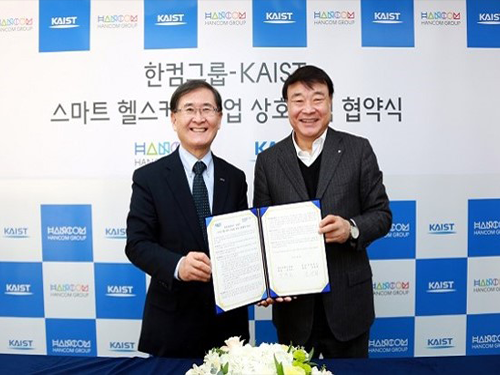 Dr.M Drives Smart Healthcare Industry in Partnership with Hancom
President Sung-Mo Kang signed an agreement on January 25 with Hancom Group Chairman Sang Chul Kim to establish a smart healthcare complex in Gapyeong, Kyonggido. With the Gapyeong complex launch, KAIST will come to commercialize Dr. M system along with other Dr.M consortium members as a new growth engine to drive the smart health industry.
Dr. M is a smart healthcare platform developed by the Health Science Research Institute at KAIST in 2014. Dr. M is capable of analyzing and predicting diseases, as well as prescribing, by incorporating ICT and medical technologies. Dr. M applies diverse technologies such as healthcare sensors, wearable devices, low-power communications technology, and cloud and big data collection platforms.
Hancom Group, a leading computer software company in Korea, has participated in the project since 2015 for advancing the smart healthcare market by developing mobile healthcare software program. Hancom joined the Dr.M consortium launched last November.
(President Kang (left) poses with Hancom Chairman Kim after signing.)
2017.02.03 View 6622
Dr.M Drives Smart Healthcare Industry in Partnership with Hancom
President Sung-Mo Kang signed an agreement on January 25 with Hancom Group Chairman Sang Chul Kim to establish a smart healthcare complex in Gapyeong, Kyonggido. With the Gapyeong complex launch, KAIST will come to commercialize Dr. M system along with other Dr.M consortium members as a new growth engine to drive the smart health industry.
Dr. M is a smart healthcare platform developed by the Health Science Research Institute at KAIST in 2014. Dr. M is capable of analyzing and predicting diseases, as well as prescribing, by incorporating ICT and medical technologies. Dr. M applies diverse technologies such as healthcare sensors, wearable devices, low-power communications technology, and cloud and big data collection platforms.
Hancom Group, a leading computer software company in Korea, has participated in the project since 2015 for advancing the smart healthcare market by developing mobile healthcare software program. Hancom joined the Dr.M consortium launched last November.
(President Kang (left) poses with Hancom Chairman Kim after signing.)
2017.02.03 View 6622 -
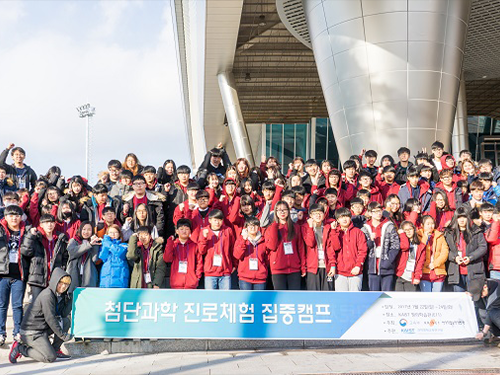 KAIST Intensive Science Camp for Middle-High School Students
The KAIST Global Institute of Talented Education (Director: Dong-Soo Kwon) invited around 90 middle and high school students for an advanced science intensive camp from January 22 to 24.
This camp targeted middle and high school students in community centers or child-care institutions. It aims to increase students’ interest in science and engineering, and assist them with their career paths through programs such as special lectures on science, advanced science projects, and career mentoring.
Participating students were divided into groups of seven or eight with a KAIST student as a mentor to conduct advanced science projects such as VR controller production and robot arm programming. The camp included exploring future career options and science and engineering college admission counselling.
Jiyoung Ryu, Research Professor for the KAIST Global Institute of Talented Education, said, “KAIST started the science and engineering career experience program in 2016 with the Ministry of Education and Korea Research Institute for Vocational Education and Training (KRIVET). So far, 6000 middle and high school students from around the country have participated. The camp is more meaningful since it educates students in social responsibility, in addition to the fields of science and engineering, both of which are missions and goals that KAIST strives for.” She continued to say, “We plan to continue to expand the program in the future.”
The KAIST Global Institute of Talented Education is actively conducting research and projects on national education for talented youth such as policy research concerning gifted education, science and engineering career education, advanced science camps, training for gifted education teachers, and cyber gifted education programs.
2017.02.01 View 8207
KAIST Intensive Science Camp for Middle-High School Students
The KAIST Global Institute of Talented Education (Director: Dong-Soo Kwon) invited around 90 middle and high school students for an advanced science intensive camp from January 22 to 24.
This camp targeted middle and high school students in community centers or child-care institutions. It aims to increase students’ interest in science and engineering, and assist them with their career paths through programs such as special lectures on science, advanced science projects, and career mentoring.
Participating students were divided into groups of seven or eight with a KAIST student as a mentor to conduct advanced science projects such as VR controller production and robot arm programming. The camp included exploring future career options and science and engineering college admission counselling.
Jiyoung Ryu, Research Professor for the KAIST Global Institute of Talented Education, said, “KAIST started the science and engineering career experience program in 2016 with the Ministry of Education and Korea Research Institute for Vocational Education and Training (KRIVET). So far, 6000 middle and high school students from around the country have participated. The camp is more meaningful since it educates students in social responsibility, in addition to the fields of science and engineering, both of which are missions and goals that KAIST strives for.” She continued to say, “We plan to continue to expand the program in the future.”
The KAIST Global Institute of Talented Education is actively conducting research and projects on national education for talented youth such as policy research concerning gifted education, science and engineering career education, advanced science camps, training for gifted education teachers, and cyber gifted education programs.
2017.02.01 View 8207 -
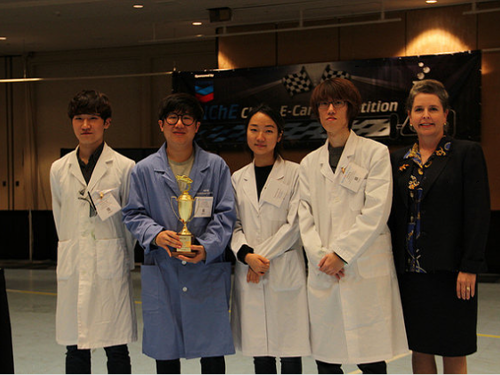 A KAIST Team Wins the Chem-E-Car Competition 2016
A KAIST team consisted of four students from the Department of Chemical and Biomolecular Engineering won the Chem-E-Car Competition 2016, which took place on November 13 at the Union Square in San Francisco. The students who participated were Young-Hyun Cha, Jin-Sol Shin, Dae-Seok Oh, and Wan-Tae Kim. Their adviser was Professor Doh Chang Lee of the same department.
Established in 1999, the Chem-E-Car is an annual worldwide college competition for students majoring in chemical engineering. The American Institute of Chemical Engineers (AIChE), founded in 1908, is the world’s leading organization for chemical engineering professionals with more than 50,000 members from over 100 countries and hosts this competition every year.
A total of 41 university teams including Carnegie Mellon University and Purdue University participated in this year’s competition.
KAIST students competed in the event for the first time in 2014 and reached the rank of 28. In 2015, the students placed 16th, and finally, took the first place in last month’s competition, followed by the Georgia Institute of Technology.
In the competition, students must design small-scale (20x30x40 cm) automobiles that operate chemically, as well as describe their research and drive their car a fixed distance down a wedge-shaped course to demonstrate the car’s capabilities. In addition to driving a specified distance (15-30 meters), the car must hold a payload of 0-500 mL of water.
The organizers tell participants the exact distance and amount of payloads one hour before the competition begins. Winners are chosen based on their finishing time and how close their car reaches the finish line. Thus, students must show sophisticated coordination of chemical reactions to win.
The KAIST team designed their car to have a stable power output using a Vanadium redox flow battery developed by Professor Hee Tak Kim of Chemical and Biomolecular Engineering. They employed iodine clock reactions to induce quick and precise chemical reactions to control their car.
KAIST’s car finished with the best run coming within 11 cm of the target line; Georgia Tech’s car reached the finish line by 13 cm and New Jersey Institute of Technology’s car by 14 cm.
Young-Hyun Cha, one of the four students, said, “When we first designed our car, we had to deal with many issues such as stalls or connection errors. We kept working on fixing these problems through trial and error, which eventually led us to success.”
For a news article on KAIST’s win at 2016 Chemi-E-Car Competition by AIChE, see the link below:
http://www.aiche.org/chenected/2016/11/koreas-kaist-wins-1st-place-2016-chem-e-car-competition-photos
2016.12.08 View 10787
A KAIST Team Wins the Chem-E-Car Competition 2016
A KAIST team consisted of four students from the Department of Chemical and Biomolecular Engineering won the Chem-E-Car Competition 2016, which took place on November 13 at the Union Square in San Francisco. The students who participated were Young-Hyun Cha, Jin-Sol Shin, Dae-Seok Oh, and Wan-Tae Kim. Their adviser was Professor Doh Chang Lee of the same department.
Established in 1999, the Chem-E-Car is an annual worldwide college competition for students majoring in chemical engineering. The American Institute of Chemical Engineers (AIChE), founded in 1908, is the world’s leading organization for chemical engineering professionals with more than 50,000 members from over 100 countries and hosts this competition every year.
A total of 41 university teams including Carnegie Mellon University and Purdue University participated in this year’s competition.
KAIST students competed in the event for the first time in 2014 and reached the rank of 28. In 2015, the students placed 16th, and finally, took the first place in last month’s competition, followed by the Georgia Institute of Technology.
In the competition, students must design small-scale (20x30x40 cm) automobiles that operate chemically, as well as describe their research and drive their car a fixed distance down a wedge-shaped course to demonstrate the car’s capabilities. In addition to driving a specified distance (15-30 meters), the car must hold a payload of 0-500 mL of water.
The organizers tell participants the exact distance and amount of payloads one hour before the competition begins. Winners are chosen based on their finishing time and how close their car reaches the finish line. Thus, students must show sophisticated coordination of chemical reactions to win.
The KAIST team designed their car to have a stable power output using a Vanadium redox flow battery developed by Professor Hee Tak Kim of Chemical and Biomolecular Engineering. They employed iodine clock reactions to induce quick and precise chemical reactions to control their car.
KAIST’s car finished with the best run coming within 11 cm of the target line; Georgia Tech’s car reached the finish line by 13 cm and New Jersey Institute of Technology’s car by 14 cm.
Young-Hyun Cha, one of the four students, said, “When we first designed our car, we had to deal with many issues such as stalls or connection errors. We kept working on fixing these problems through trial and error, which eventually led us to success.”
For a news article on KAIST’s win at 2016 Chemi-E-Car Competition by AIChE, see the link below:
http://www.aiche.org/chenected/2016/11/koreas-kaist-wins-1st-place-2016-chem-e-car-competition-photos
2016.12.08 View 10787 -
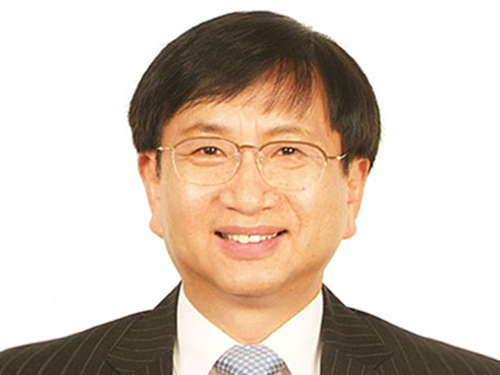 Professor Kwon to Represent the Asia-Pacific Region of the IEEE RAS
Professor Dong-Soon Kwon of the Mechanical Engineering Department at KAIST has been reappointed to the Administrative Committee of the Institute of Electrical and Electronics Engineers (IEEE) Robotics and Automation Society (IEEE RAS). Beginning January 1, 2017, he will serve his second three-year term, which will end in 2019. In 2014, he was the first Korean appointed to the committee, representing the Asia-Pacific community of the IEEE Society.
Professor Kwon said, “I feel thankful but, at the same time, it is a great responsibility to serve the Asian research community within the Society. I hope I can contribute to the development of robotics engineering in the region and in Korea as well.”
Consisted of 18 elected members, the administrative committee manages the major activities of IEEE RAS including hosting its annual flagship meeting, the International Conference on Robotics and Automation.
The IEEE RAS fosters the advancement in the theory and practice of robotics and automation engineering and facilitates the exchange of scientific and technological knowledge that supports the maintenance of high professional standards among its members.
2016.12.06 View 9766
Professor Kwon to Represent the Asia-Pacific Region of the IEEE RAS
Professor Dong-Soon Kwon of the Mechanical Engineering Department at KAIST has been reappointed to the Administrative Committee of the Institute of Electrical and Electronics Engineers (IEEE) Robotics and Automation Society (IEEE RAS). Beginning January 1, 2017, he will serve his second three-year term, which will end in 2019. In 2014, he was the first Korean appointed to the committee, representing the Asia-Pacific community of the IEEE Society.
Professor Kwon said, “I feel thankful but, at the same time, it is a great responsibility to serve the Asian research community within the Society. I hope I can contribute to the development of robotics engineering in the region and in Korea as well.”
Consisted of 18 elected members, the administrative committee manages the major activities of IEEE RAS including hosting its annual flagship meeting, the International Conference on Robotics and Automation.
The IEEE RAS fosters the advancement in the theory and practice of robotics and automation engineering and facilitates the exchange of scientific and technological knowledge that supports the maintenance of high professional standards among its members.
2016.12.06 View 9766 -
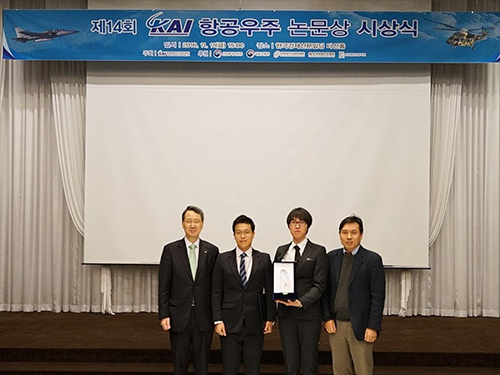 Aerospace Engineering Students Win the Minister's Award
On November 11, 2016, students from KAIST’s Aerospace Engineering Department won the Minister’s Award of Trade, Industry and Energy of Korea at the 14th Research Paper Competition hosted by Korea Aerospace Industries (KAI). The award came with a cash prize of USD 1,200 as well as opportunities to visit international airshows held abroad.
The KAIST students' paper introduced a novel design concept for "a virtual-fighter-pilot system for unmanned combat aerial vehicles to enable them to engage in mass aerial combat."
This was one of the two highest honors given to contestants. A group of students from Korea Aerospace University received the other grand prize from the Minister of Land, Infrastructure and Transport of Korea.
The KAIST team consisted of two doctoral students, Hee-Min Shin and Jae-Hyun Lee, and one Master’s student, Hyun-Gi Kim. Their advisor, Professor “David” Hyunchul Shim, received the Special Achievement Award for his contribution to the paper.
KAI’s competition was established in 2003 to spur academic interest and research in aerospace engineering. Over the past 14 years, contestants have submitted 376 papers, and KAI has published 88 papers. KAI has positioned itself as the host of one of the most prestigious research paper competitions held in Korea in the area of aerospace engineering.
The Korean Society for Aeronautical and Space Sciences, the Korea Aerospace Industries Association, and the Korea Civil Aviation Development Association also sponsored the competition, with the Ministries of Trade, Industry and Energy and of Land, Infrastructure and Transport.
Professor Shim said, “This represents a great honor for our students. In recent years, research in unmanned aerial systems has increased tremendously throughout the world, and I hope KAIST will continue to inspire and innovate research in this field.”
Pictured from left to right are Hee-Min Shin, Jae-Hyun Lee, and Hyun-Gi Kim.
Pictured from right to left are Professor Hyunchul Shim, Hyun-Gi Kim, Hee-Min Shin, and Vice President Sung-Sup Chang of Korea Aerospace Industries.
2016.11.22 View 11641
Aerospace Engineering Students Win the Minister's Award
On November 11, 2016, students from KAIST’s Aerospace Engineering Department won the Minister’s Award of Trade, Industry and Energy of Korea at the 14th Research Paper Competition hosted by Korea Aerospace Industries (KAI). The award came with a cash prize of USD 1,200 as well as opportunities to visit international airshows held abroad.
The KAIST students' paper introduced a novel design concept for "a virtual-fighter-pilot system for unmanned combat aerial vehicles to enable them to engage in mass aerial combat."
This was one of the two highest honors given to contestants. A group of students from Korea Aerospace University received the other grand prize from the Minister of Land, Infrastructure and Transport of Korea.
The KAIST team consisted of two doctoral students, Hee-Min Shin and Jae-Hyun Lee, and one Master’s student, Hyun-Gi Kim. Their advisor, Professor “David” Hyunchul Shim, received the Special Achievement Award for his contribution to the paper.
KAI’s competition was established in 2003 to spur academic interest and research in aerospace engineering. Over the past 14 years, contestants have submitted 376 papers, and KAI has published 88 papers. KAI has positioned itself as the host of one of the most prestigious research paper competitions held in Korea in the area of aerospace engineering.
The Korean Society for Aeronautical and Space Sciences, the Korea Aerospace Industries Association, and the Korea Civil Aviation Development Association also sponsored the competition, with the Ministries of Trade, Industry and Energy and of Land, Infrastructure and Transport.
Professor Shim said, “This represents a great honor for our students. In recent years, research in unmanned aerial systems has increased tremendously throughout the world, and I hope KAIST will continue to inspire and innovate research in this field.”
Pictured from left to right are Hee-Min Shin, Jae-Hyun Lee, and Hyun-Gi Kim.
Pictured from right to left are Professor Hyunchul Shim, Hyun-Gi Kim, Hee-Min Shin, and Vice President Sung-Sup Chang of Korea Aerospace Industries.
2016.11.22 View 11641 -
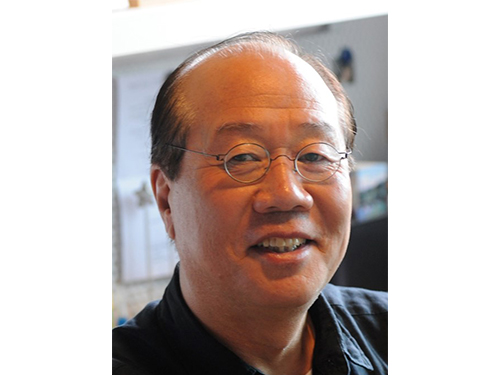 Professor Kun-pyo Lee Appointed Honorary Fellow of the Design Research Society
Founded in the United Kingdom (UK) in 1966, the Design Research Society is an international academic organization that promotes excellence in design and supports the interests of the design research community.
Professor Kun-pyo Lee of the Industrial Design Department at KAIST received his honorary fellowship from the Society at its 50th international conference held from June 27, 2016 to July 3, 2016 in Brighton, UK.
The Society recognized Professor Lee’s academic achievements and his contribution to the advancement of design research nationally and globally. To date, only eight researchers have received honorary fellowships from the Society, and he is the first Asian to become an honorary fellow.
Professor Lee has worked at KAIST for more than 30 years as a professor in industrial engineering and served on various important positions such as the president of the Korean Society of Design Science, the president of the International Association of Societies of Design Research, an executive vice president of the Corporate Design Center at LG Electronics, and an advisory board member for Human-centered Design Network in Japan and UXnet in the United States.
By introducing the concept of user experience (UX) in Korea for the first time, he developed this field while focusing on user-centered designs to optimize interactive digital products as well as interaction design to create mental and physical interfaces between people and interactive digital products, services, and systems.
Professor Lee said, “I am pleased to become an honorary fellow of the Design Research Society. For quiet some time, industrial design remained in the domain of practical studies, lacking the kind of support needed to grow as an independent academic and research discipline, but this has changed rapidly in recent years. I will continue to remain actively involved in the development of industrial design engineering in Korea and the world.”
2016.07.19 View 8041
Professor Kun-pyo Lee Appointed Honorary Fellow of the Design Research Society
Founded in the United Kingdom (UK) in 1966, the Design Research Society is an international academic organization that promotes excellence in design and supports the interests of the design research community.
Professor Kun-pyo Lee of the Industrial Design Department at KAIST received his honorary fellowship from the Society at its 50th international conference held from June 27, 2016 to July 3, 2016 in Brighton, UK.
The Society recognized Professor Lee’s academic achievements and his contribution to the advancement of design research nationally and globally. To date, only eight researchers have received honorary fellowships from the Society, and he is the first Asian to become an honorary fellow.
Professor Lee has worked at KAIST for more than 30 years as a professor in industrial engineering and served on various important positions such as the president of the Korean Society of Design Science, the president of the International Association of Societies of Design Research, an executive vice president of the Corporate Design Center at LG Electronics, and an advisory board member for Human-centered Design Network in Japan and UXnet in the United States.
By introducing the concept of user experience (UX) in Korea for the first time, he developed this field while focusing on user-centered designs to optimize interactive digital products as well as interaction design to create mental and physical interfaces between people and interactive digital products, services, and systems.
Professor Lee said, “I am pleased to become an honorary fellow of the Design Research Society. For quiet some time, industrial design remained in the domain of practical studies, lacking the kind of support needed to grow as an independent academic and research discipline, but this has changed rapidly in recent years. I will continue to remain actively involved in the development of industrial design engineering in Korea and the world.”
2016.07.19 View 8041 -
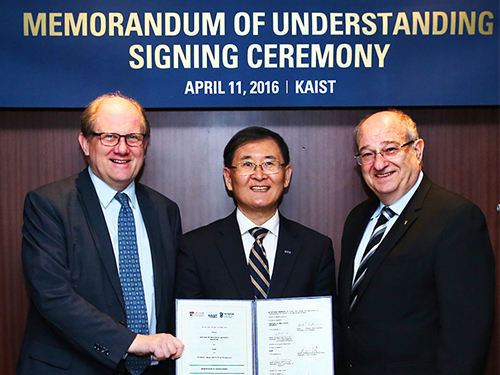 KAIST, NTU, and Technion Collaborate for Research in Emerging Fields
KAIST, Nanyang Technological University (NTU) of Singapore, and Technion of Israel signed an agreement on April 11, 2016 in Seoul to create a five-year joint research program for some of the most innovative and entrepreneurial areas: robotics, medical technologies, satellites, materials science and engineering, and entrepreneurship. Under the agreement, the universities will also offer dual degree opportunities, exchange visits, and internships.
In the picture from the left, Bertil Andersson of NTU, Sung-Mo Kang of KAIST, and Peretz Lavie of Technion hold the signed memorandum of understanding.
2016.04.14 View 11482
KAIST, NTU, and Technion Collaborate for Research in Emerging Fields
KAIST, Nanyang Technological University (NTU) of Singapore, and Technion of Israel signed an agreement on April 11, 2016 in Seoul to create a five-year joint research program for some of the most innovative and entrepreneurial areas: robotics, medical technologies, satellites, materials science and engineering, and entrepreneurship. Under the agreement, the universities will also offer dual degree opportunities, exchange visits, and internships.
In the picture from the left, Bertil Andersson of NTU, Sung-Mo Kang of KAIST, and Peretz Lavie of Technion hold the signed memorandum of understanding.
2016.04.14 View 11482 -
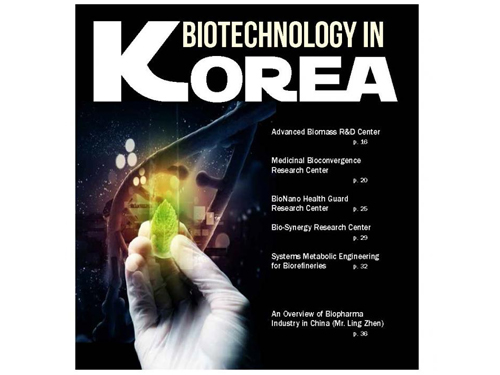 Asia Pacific Biotech News' Special Coverage of Korean Biotechnology
The Asia Pacific Biotech News covered five major biotechnology research projects sponsored by the Korean government in the areas of biofuels, biomedicine, bio-nano healthcare, and biorefinery.
The Asia Pacific Biotech News (APBN), a monthly magazine based in Singapore, which offers comprehensive reports on the fields of pharmaceuticals, healthcare, and biotechnology, recently published a special feature on Korea’s biotechnology research and development (R&D) programs.
The magazine feature selected five research programs sponsored by the Korean government, which are either part of the Global Frontier or the Climate Change Technology Development Projects.
The programs are:
Systems Metabolic Engineering Research: Distinguished Professor Sang Yup Lee
of the Chemical and Biomolecular Engineering Department at the Korea Advanced
Institute of Science and Technology (KAIST) has been leading a research group to
develop biorefining technology using renewable non-food biomass to produce
chemicals, fuels, and materials that were largely drawn from fossil resources
through petrochemical refinery processes. Applying a systems metabolic
engineering approach, the group succeeded in modifying the metabolic pathways of
microorganisms. As a result, they produced, for the first time in the world,
engineered plastic raw materials and gasoline. The team also developed a technique
to produce butanol and succinic acid with a higher titer and yield using metabolically
engineered microorganisms.
Next-generation Biomass Research: Under the leadership of Professor Yong-
Keun Chang of the Chemical and Biomolecular Engineering Department at KAIST,
the research project, which belongs to the Global Frontier Project, develops biofuels
and bioproducts utilizing microalgae typically found in water and other marine
systems.
Convergence Research for Biomedicine: Professor Sung-Hoon Kim of Seoul
National University leads this project that develops targeted new drugs based on
convergence research strategies.
Bionano Healthcare Chip Research: Director Bong-Hyun Chung of the Korea
Research Institute of Bioscience and Biotechnology has integrated information and
communications technology, nanotechnology, and biotechnology to develop a
diagnostic kit that can screen toxic germs, virus, and toxic materials in a prompt
and accurate manner.
Biosynergy Research: Led by Professor Do-Hun Lee of the Bio and Brain
Engineering Department at KAIST, this research project develops new treatments
with a multi-target, multi-component approach in the context of systems biology
through an analysis of synergistic reactions between multi-compounds in traditional
East Asian medicine and human metabolites. In East Asian medicine, treatment and
caring of the human body are considered analogous to the politics of governing a
nation. Based on such system, the research focuses on designing a foundation for
the integration of traditional medicine with modern drug discovery and development.
Director Ilsub Baek at the Platform Technology Division of the Ministry of Science, ICT and Future Planning, Republic of Korea, who is responsible for the Global Frontier Program and the Technology to Solve Climate Change, said, “It is great to see that Asia Pacific Biotech News published an extensive coverage of Korea’s several key research programs on biotechnology as its first issue of this year. I am sure that these programs will lead to great outcomes to solve many worldwide pending issues including climate change and healthcare in the aging society.”
Professor Sang Yup Lee, who served as an editor of the feature, said, “At the request of the magazine, we have already published lead articles on our biotechnology research three times in the past in 2002, 2006, and 2011. I am pleased to see continued coverage of Korean biotechnology by the magazine because it recognizes the excellence of our research. Biotechnology has emerged as one of the strong fields that addresses important global issues such as climate change and sustainability.”
2016.02.04 View 12910
Asia Pacific Biotech News' Special Coverage of Korean Biotechnology
The Asia Pacific Biotech News covered five major biotechnology research projects sponsored by the Korean government in the areas of biofuels, biomedicine, bio-nano healthcare, and biorefinery.
The Asia Pacific Biotech News (APBN), a monthly magazine based in Singapore, which offers comprehensive reports on the fields of pharmaceuticals, healthcare, and biotechnology, recently published a special feature on Korea’s biotechnology research and development (R&D) programs.
The magazine feature selected five research programs sponsored by the Korean government, which are either part of the Global Frontier or the Climate Change Technology Development Projects.
The programs are:
Systems Metabolic Engineering Research: Distinguished Professor Sang Yup Lee
of the Chemical and Biomolecular Engineering Department at the Korea Advanced
Institute of Science and Technology (KAIST) has been leading a research group to
develop biorefining technology using renewable non-food biomass to produce
chemicals, fuels, and materials that were largely drawn from fossil resources
through petrochemical refinery processes. Applying a systems metabolic
engineering approach, the group succeeded in modifying the metabolic pathways of
microorganisms. As a result, they produced, for the first time in the world,
engineered plastic raw materials and gasoline. The team also developed a technique
to produce butanol and succinic acid with a higher titer and yield using metabolically
engineered microorganisms.
Next-generation Biomass Research: Under the leadership of Professor Yong-
Keun Chang of the Chemical and Biomolecular Engineering Department at KAIST,
the research project, which belongs to the Global Frontier Project, develops biofuels
and bioproducts utilizing microalgae typically found in water and other marine
systems.
Convergence Research for Biomedicine: Professor Sung-Hoon Kim of Seoul
National University leads this project that develops targeted new drugs based on
convergence research strategies.
Bionano Healthcare Chip Research: Director Bong-Hyun Chung of the Korea
Research Institute of Bioscience and Biotechnology has integrated information and
communications technology, nanotechnology, and biotechnology to develop a
diagnostic kit that can screen toxic germs, virus, and toxic materials in a prompt
and accurate manner.
Biosynergy Research: Led by Professor Do-Hun Lee of the Bio and Brain
Engineering Department at KAIST, this research project develops new treatments
with a multi-target, multi-component approach in the context of systems biology
through an analysis of synergistic reactions between multi-compounds in traditional
East Asian medicine and human metabolites. In East Asian medicine, treatment and
caring of the human body are considered analogous to the politics of governing a
nation. Based on such system, the research focuses on designing a foundation for
the integration of traditional medicine with modern drug discovery and development.
Director Ilsub Baek at the Platform Technology Division of the Ministry of Science, ICT and Future Planning, Republic of Korea, who is responsible for the Global Frontier Program and the Technology to Solve Climate Change, said, “It is great to see that Asia Pacific Biotech News published an extensive coverage of Korea’s several key research programs on biotechnology as its first issue of this year. I am sure that these programs will lead to great outcomes to solve many worldwide pending issues including climate change and healthcare in the aging society.”
Professor Sang Yup Lee, who served as an editor of the feature, said, “At the request of the magazine, we have already published lead articles on our biotechnology research three times in the past in 2002, 2006, and 2011. I am pleased to see continued coverage of Korean biotechnology by the magazine because it recognizes the excellence of our research. Biotechnology has emerged as one of the strong fields that addresses important global issues such as climate change and sustainability.”
2016.02.04 View 12910 -
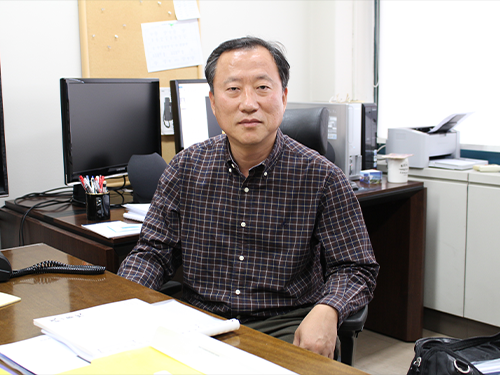 Professor Tae-Eog Lee Receives December's Scientist of the Month Award by the Korean Government
Professor Tae-Eog Lee of the Industrial and Systems Engineering at KAIST received the Scientist of the Month Award for December 2015. The award is sponsored by the Ministry of Science, ICT and Future Planning of Korea, which was hosted by the National Research Foundation of Korea.
The award recognizes Professor Lee’s efforts to advance the field of semiconductor device fabrication processing. This includes the development of the most efficient scheduling and controlling of cluster tools. He also created mathematical solutions to optimize the complicated cycle time of cluster tools in semiconductor manufacturing and the process of robot task workload.
Professor Lee contributed to the formation of various discrete event systems and automation systems based on his mathematical theories and solutions and advanced a scheduling technology for the automation of semiconductor production.
He has published 18 research papers in the past three years and has pioneered to develop Korean tool schedulers through the private sector-university cooperation.
2015.12.10 View 7639
Professor Tae-Eog Lee Receives December's Scientist of the Month Award by the Korean Government
Professor Tae-Eog Lee of the Industrial and Systems Engineering at KAIST received the Scientist of the Month Award for December 2015. The award is sponsored by the Ministry of Science, ICT and Future Planning of Korea, which was hosted by the National Research Foundation of Korea.
The award recognizes Professor Lee’s efforts to advance the field of semiconductor device fabrication processing. This includes the development of the most efficient scheduling and controlling of cluster tools. He also created mathematical solutions to optimize the complicated cycle time of cluster tools in semiconductor manufacturing and the process of robot task workload.
Professor Lee contributed to the formation of various discrete event systems and automation systems based on his mathematical theories and solutions and advanced a scheduling technology for the automation of semiconductor production.
He has published 18 research papers in the past three years and has pioneered to develop Korean tool schedulers through the private sector-university cooperation.
2015.12.10 View 7639 -
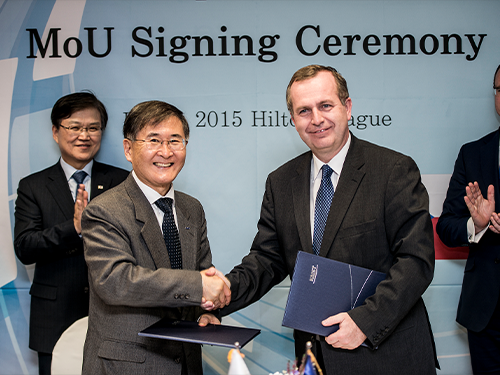 KAIST and Charles University Agree to Cooperate
KAIST and Charles University in Prague, the Czech Republic, agreed to cooperate in research and education.
President Steve Kang of KAIST (pictured on the left) and Rector Tomáš Zima of Charles University signed the agreement on December 2, 2015, at the Hilton Hotel in Prague.
Minster Yang-Hee Choi of Science, ICT and Future Planning of the Republic of Korea and Minister Kateřina Valachová of Education, Youth and Sports of the Czech Republic also joined the signing ceremony.
Under the agreement, the two institutions will exchange students and researchers, as well as implement joint research programs.
President Kang said, “We are pleased to work with one of the most prestigious universities in the Czech Republic and hope to build a good partnership in the years ahead.”
Founded in 1348, Charles University in Prague is the oldest and largest university in the Czech Republic. The university received two Nobel prizes in physiology or medicine and in chemistry in 1947 and 1959, respectively.
2015.12.03 View 7824
KAIST and Charles University Agree to Cooperate
KAIST and Charles University in Prague, the Czech Republic, agreed to cooperate in research and education.
President Steve Kang of KAIST (pictured on the left) and Rector Tomáš Zima of Charles University signed the agreement on December 2, 2015, at the Hilton Hotel in Prague.
Minster Yang-Hee Choi of Science, ICT and Future Planning of the Republic of Korea and Minister Kateřina Valachová of Education, Youth and Sports of the Czech Republic also joined the signing ceremony.
Under the agreement, the two institutions will exchange students and researchers, as well as implement joint research programs.
President Kang said, “We are pleased to work with one of the most prestigious universities in the Czech Republic and hope to build a good partnership in the years ahead.”
Founded in 1348, Charles University in Prague is the oldest and largest university in the Czech Republic. The university received two Nobel prizes in physiology or medicine and in chemistry in 1947 and 1959, respectively.
2015.12.03 View 7824 -
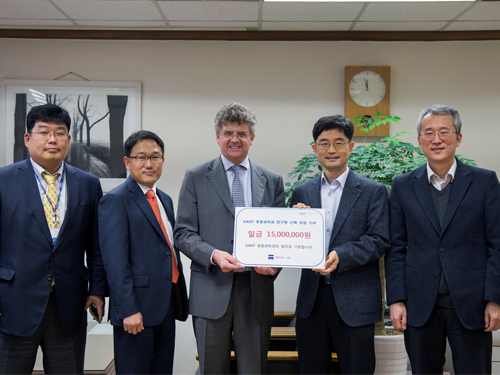 More Donations Arrive to Establish the New Medicine Research and Development Center on Campus
A raft of businesses continues to make donations to establish a new medicine research and development center on campus. The Department of Biological Sciences at KAIST is leading the fundraising campaign.
On November 9, 2015, Nikon Instruments Korea Co., Ltd. contributed USD 8,500 to the fundraising, followed by Carl Zeiss AG and Three-Shine Inc., which donated USD 12,800 and 8,500, respectively.
Bruno Lin, an Executive Director at Carl Zeiss AG in Korea, said, “I’m very glad to participate in this fundraising initiative for the Biological Sciences Department at KAIST, one rapidly reaching out to the world.”
From the left in the picture are Vice President Tae-Hoon Kim, Director Gyu-Hyeok Lee, and Executive Director Bruno Lin of Carl Zeiss AG, Byung-Ha Oh, Dean of the Biological Sciences Department, and Professor Eunjoon Kim.
From the left in the picture are Byung-Ha Oh, Dean of the Biological Sciences Department, President Chun-Gui Park of Three-Shine Inc., and Professor Daesoo Kim.
President Chun of Three-Shine Inc., said, “We hope that the Department of Biological Sciences at KAIST, aided by the construction of new research center, will produce practical research achievements and stand on the frontier of new medicine development research in Korea.”
The New Medicine Research and Development Center will be equipped with state-of-the-art, purpose-built research facilities to support convergent, interdisciplinary research in biomedicine.
2015.11.27 View 7728
More Donations Arrive to Establish the New Medicine Research and Development Center on Campus
A raft of businesses continues to make donations to establish a new medicine research and development center on campus. The Department of Biological Sciences at KAIST is leading the fundraising campaign.
On November 9, 2015, Nikon Instruments Korea Co., Ltd. contributed USD 8,500 to the fundraising, followed by Carl Zeiss AG and Three-Shine Inc., which donated USD 12,800 and 8,500, respectively.
Bruno Lin, an Executive Director at Carl Zeiss AG in Korea, said, “I’m very glad to participate in this fundraising initiative for the Biological Sciences Department at KAIST, one rapidly reaching out to the world.”
From the left in the picture are Vice President Tae-Hoon Kim, Director Gyu-Hyeok Lee, and Executive Director Bruno Lin of Carl Zeiss AG, Byung-Ha Oh, Dean of the Biological Sciences Department, and Professor Eunjoon Kim.
From the left in the picture are Byung-Ha Oh, Dean of the Biological Sciences Department, President Chun-Gui Park of Three-Shine Inc., and Professor Daesoo Kim.
President Chun of Three-Shine Inc., said, “We hope that the Department of Biological Sciences at KAIST, aided by the construction of new research center, will produce practical research achievements and stand on the frontier of new medicine development research in Korea.”
The New Medicine Research and Development Center will be equipped with state-of-the-art, purpose-built research facilities to support convergent, interdisciplinary research in biomedicine.
2015.11.27 View 7728